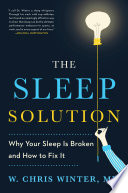

The book delves into the structure of sleep, explaining the different stages, including REM and non-REM sleep. Understanding these stages is crucial for recognizing how sleep cycles affect overall health and well-being. The author emphasizes the importance of deep sleep for physical restoration and REM sleep for emotional regulation and cognitive function. By understanding sleep architecture, readers can better appreciate the need for adequate sleep duration and quality, leading to improved health outcomes.
Continue readingA significant theme in the book is the profound impact sleep has on physical and mental health. The author presents research linking poor sleep to various health issues, including obesity, diabetes, cardiovascular diseases, and mental health disorders like anxiety and depression. The discussion includes how chronic sleep deprivation can lead to systemic inflammation and hormonal imbalances, further emphasizing the necessity of prioritizing sleep for maintaining overall health.
Continue readingThe book offers practical advice on sleep hygiene, which includes habits and environmental factors that promote better sleep. The author outlines strategies such as maintaining a consistent sleep schedule, creating a restful sleep environment, and limiting exposure to screens before bedtime. Additionally, the importance of relaxation techniques, such as meditation and deep breathing, is highlighted to help individuals wind down and prepare for restful sleep. Implementing these practices can significantly improve sleep quality.
Continue readingOne of the standout solutions presented in the book is Cognitive Behavioral Therapy for Insomnia (CBT-I). This evidence-based approach addresses the thoughts and behaviors that contribute to sleep problems. The author explains how CBT-I can help individuals reframe their relationship with sleep, reduce anxiety around bedtime, and develop healthier sleep habits. The effectiveness of CBT-I is supported by numerous studies, making it a recommended method for those struggling with insomnia.
Continue readingThe author discusses how lifestyle choices, such as diet, exercise, and stress management, play a critical role in sleep quality. The book emphasizes that a balanced diet, regular physical activity, and effective stress reduction techniques can enhance sleep. The relationship between caffeine, alcohol, and sleep is explored, providing insights into how these substances can disrupt normal sleep patterns. Readers are encouraged to adopt healthier lifestyle choices to foster better sleep.
Continue readingThe book addresses the often-overlooked topic of napping as a tool for enhancing overall sleep quality and cognitive function. The author explains the benefits of short naps for improving alertness and performance, especially in cultures that undervalue rest. Guidelines for effective napping, including duration and timing, are provided, allowing readers to incorporate naps into their daily routines without negatively impacting nighttime sleep.
Continue readingThe author debunks common myths and misconceptions surrounding sleep, such as the belief that one can 'catch up' on sleep during weekends or that older adults need less sleep. By clarifying these misunderstandings, the book aims to reshape readers' perceptions of sleep and its importance. Recognizing and dispelling these myths is essential for fostering a culture that values and prioritizes adequate sleep for all age groups.
Continue readingThe reading time for The Sleep Solution depends on the reader's pace. However, this concise book summary covers the 7 key ideas from The Sleep Solution, allowing you to quickly understand the main concepts, insights, and practical applications in around 22 min.
The Sleep Solution is definitely worth reading. The book covers essential topics including Understanding Sleep Architecture, The Impact of Sleep on Health, Sleep Hygiene Practices, providing practical insights and actionable advice. Whether you read the full book or our concise summary, The Sleep Solution delivers valuable knowledge that can help you improve your understanding and apply these concepts in your personal or professional life.
The Sleep Solution was written by W. Chris Winter.
If you enjoyed The Sleep Solution by W. Chris Winter and want to explore similar topics or deepen your understanding, we highly recommend these related book summaries:
These books cover related themes, complementary concepts, and will help you build upon the knowledge gained from The Sleep Solution. Each of these summaries provides concise insights that can further enhance your understanding and practical application of the ideas presented in The Sleep Solution.